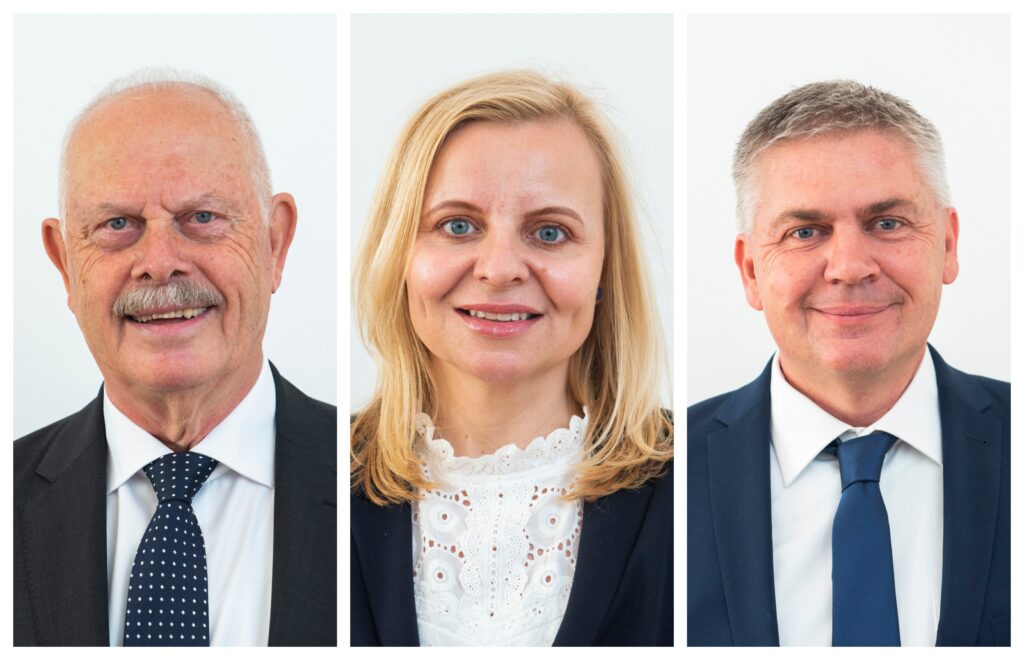Yesterday’s vote on the Declaration on the commemoration of the mass murder by starvation – genocide in Ukraine, which was proposed by members of the coalition parties the Social Democrats (Socialni demokrati – SD) and the Freedom Movement (Gibanje Svoboda) – namely, by MPs Jani Prednik, Predrag Baković and Borut Sajovic, took an unusual turn. Three Freedom Movement party MPs – Miroslav Gregorič, Martin Premk and Monika Pekošak, voted against the declaration, alongside the MPs of Luka Mesec’s Left party (Levica), all of whom voted against it. The Speaker of the National Assembly, Urška Klakočar Zupančič, and MPs Mojca Pašek Šetinc and Franc Props registered as present at the session, but they did not vote on the declaration in question. A few more members of the ruling party did not register as present at the session but were present in the National Assembly at the time of the vote – for example, Lena Grgurevič and Tamara Vonta.
Speaking on behalf of the government, Samuel Žbogar said before the vote that the government supported the resolution, thus joining other countries in condemning one of the most atrocious crimes of the 20th century and a human tragedy that had caused untold sacrifices and the suffering and death of millions of Ukrainians, as well as other inhabitants of Belarus, Kazakhstan, Moldova and other Soviet republics.
On behalf of the government, Žbogar noted that the commemoration of the 90th anniversary of the Holodomor genocide comes at a time when Russia has been carrying out military aggression against Ukraine for more than a year, deliberately destroying civilian and critical infrastructure in Ukraine, including agricultural facilities, by mining farmland, plundering Ukraine’s grain reserves, and making it difficult for the attacked country to export grain to the most vulnerable countries, thereby also creating a food crisis. Žbogar also noted that it was important to support awareness-raising on the horrors of the Stalinist regime, with the intention of ensuring that such atrocities are never allowed to happen again. This is how we can preserve the memory of all the victims of the genocide and express solidarity with the families of the victims. By adopting this declaration, Slovenia joins the thirteen countries of the European Union and twelve other countries that have already adopted such declarations. France was the last European Union Member State to do so, he added.
Before the vote, all parties announced their support, with the exception of the government’s Left party. The leader of the Left party’s parliamentary group, Matej Tašner Vatovec, also announced that they would vote against the motion, explaining that history should be judged by historians, who are not among the MPs, and explaining his opposition by saying, among other things, that “Holodomor happened. It cannot be denied, and I hope no one will deny it. But there is no unified view of the historical profession on the causes and reasons for this event. Therefore, to label it a genocide, one of the worst and most reprehensible crimes in international law, in order to draw parallels between the Russian Federation today and Stalin’s Soviet Union before the 1990s is, in our view, irresponsible. There have been many similar atrocities in modern and contemporary history, and we think it would be reasonable to then start making declarations about every similar atrocity committed by man against another man in modern and contemporary history.”
The motion by MPs from the government parties and the government in support of Ukraine is supported by both opposition parties, Slovenian Democratic Party (Slovenska Demokratska stranka – SDS) and New Slovenia party (Nova Slovenija – NSi). Dejan Kaloh, speaking on behalf of the larger opposition party, the SDS party, noted that “At the national level, the Holodomor has so far been recognised as genocide by Estonia, Hungary, Latvia, Lithuania, Poland, Portugal, Germany, the Czech Republic, Ireland, Bulgaria, Moldova, Australia, Canada, Colombia, Ecuador, Mexico, Paraguay, Peru, the United States and Chile. On the 14th of November 2005, Lithuania adopted a Declaration of the Parliament of the Lithuanian Republic in Memory of the Victims of Political Repression and Famine in Ukraine in 1932 and 1933, in which it acknowledges that Stalin’s totalitarian communist regime carried out a conscious, carefully planned genocide against the Ukrainian people in 1932-1933 and expresses, of course, its condolences to the victims of the genocide in Ukraine during those years and its solidarity with the Ukrainian people. On the 16th of March 2006, Poland adopted a resolution of the Senate of the Republic of Poland on the occasion of the anniversary of the Holodomor genocide in Ukraine, stating, inter alia, that the Senate of the Republic of Poland stands in solidarity with the Ukrainian position that the Genocide of 1932, 1933 be recognised as a crime of genocide and that the main perpetrators responsible for this crime be named. Then, on the 21st of November 2018, the Senate of the Republic of Poland adopted another resolution, commemorating the anniversary of the Genocide in Ukraine. Germany, for example, in the Bundestag resolution, which was adopted by the German Parliament on the 30th of November 2022, stated that the famine and repression had affected the whole of Ukraine, not just its grain-growing regions. From today’s perspective, the historical and political classification of the genocide is obvious. The German Bundestag agrees with this classification, and therefore, in the final stage of our position, we in the SDS parliamentary group will, of course, support the proposed declaration and join the countries that have recognised the Holodomor as genocide, and the call for countries to raise awareness of these events and other crimes of the Soviet regime, adding historical knowledge about them to education and research programmes in order to prevent similar tragedies in the future, as this is the only way to demonstrate that they support the recognition of the Ukrainian Holodomor, i.e. the mass starvation massacre, as genocide, and thus contribute to preventing the recurrence of similar atrocities. “


